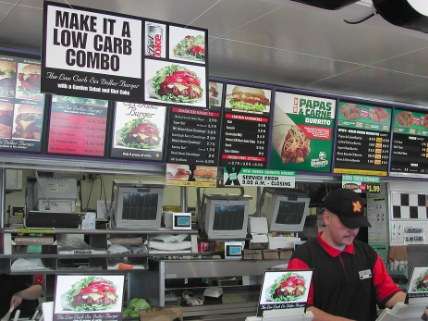Enforcement Looms of FDA's Menu Labeling Regulations
Expensive calorie count mandate set to begin on May 5. Is delay or repeal possible?

FDA enforcement of its absurd rules governing mandatory calorie menu labeling, passed in 2010 as part of Obamacare, is set to begin on May 5, after years of delays.
In 2015, the FDA delayed implementing the rules until December 2016, after the presidential election. At the time, The Hill speculated that a new "Republican president could choose to scrap the rule altogether."
That hasn't happened. Yet. But in December 2016 the FDA delayed enforcing the rules until May 5, 2017, which is the deadline that now looms.
The FDA interprets its menu-labeling rules as requiring mandatory calorie labeling of most foods sold by "restaurants and similar retail food establishments if they are part of a chain of 20 or more locations, doing business under the same name, offering for sale substantially the same menu items and offering for sale restaurant-type foods." Owners of more than twenty vending machines must also comply with the rules.
The rules would be a disaster. They'll cost at least $1 billion. And if they're grounded in science, that science is shoddy.
The purpose of menu-labeling rules in general is to help consumers make smarter (read: lower-calorie) choices. But the very premise that mandatory menu labeling accomplishes this is flawed. Research demonstrates that menu labeling doesn't improve consumer food choices. That's something I first noted here in 2011, and which subsequent reports have also shown (see, for example, here, here, here, and here).
So can the rules be stopped?
Yes. Congress could act by repealing or amending the menu-labeling rules. Or food sellers whose First Amendment rights would be violated by rules that compel speech for no constitutionally supported reason could ask a court to halt implementation of the rules. Or the FDA could delay the rules from taking effect.
Each of these is possible. But how likely are these outcomes? While the clock is ticking, furious efforts are underway to halt the rules.
Earlier this year, Congress introduced a bill supported by the American Pizza Community, an advocacy group that includes pizza companies like Domino's and Pizza Hut. The bill, the Common Sense Nutrition Disclosure Act, would exempt most pizza-delivery companies and delay implementation of the menu-labeling rules by at least two years. A comparable bill passed out of the House last year but died in the Senate.
While pizza makers are working in Congress, two other groups that oppose the law, the National Grocers Association and National Association of Convenience Stores, petitioned the FDA this month in an effort to delay or halt implementation of the rules. The petitioners argue compliance with the "unworkable" rules is impossible; that the costs of complying are exorbitant and far exceed FDA estimates; that the FDA exceeded its authority in adopting the rules; that the rules run afoul of the First Amendment; and that the rules are "inconsistent with the [Trump] Administration's agenda to alleviate unnecessary regulatory burdens on business."
Pushing back against these efforts is the voice of the restaurant industry—the National Restaurant Association—a staunch supporter of the FDA menu-labeling rules. That stance might surprise some—if for no other reason than that it's got some basis beyond rent-seeking.
"With more and more states adopting their own menu-labeling rules, the National Restaurant Association… sought a shield against this death by 1,000 cuts by pushing for one uniform national menu-labeling rule," I explained in a 2013 column.
Will one or more of the aforementioned approaches succeed in stymying the rules from taking effect on May 5? Repeal seems like something Congress won't stomach. Consider that the GOP's ham-fisted attempts to repeal, replace, or rename (or whatever) the Affordable Care Act completely ignored the ACA's menu-labeling provisions. Amending the rules via the Common Sense Nutrition Disclosure Act seems a more likely path.
"[T]here's now been so much time and money sunk into the process that none of the major lobbying groups are trying to get rid of the mandate as part of the Obamacare repeal," Politico reported a week after Pres. Trump took office. "Instead, they say, they want Congress to pass legislation that would tweak the FDA rule to make it easier for businesses to comply."
But the restaurant lobby would strongly oppose efforts to carve out exceptions to the rules.
I'd be stunned if the Trump administration ignores the very real concerns of grocers, convenience stores, and pizza makers. But if the GOP delays or amends implementing the rule for those groups, I also expect they'd have to delay it for National Restaurant Association members, too. In short, it's complicated.
I think the best bets—both in terms of its likelihood and efficacy—is either that the FDA responds to the petition from the National Grocers Association and National Association of Convenience Stores and uses the petition as a basis to delay implementing the rules or that those same parties—perhaps in conjunction with the American Pizza Community—sues the FDA in federal court, seeking an injunction that would delay or halt enforcement of the menu-labeling rules.
But time's running out. In the meantime, restaurants, movie theaters, vending machine owners, grocers, and pizza franchise owners are in a very difficult spot. They're forced to weigh the potential expenses of sinking thousands of dollars each into signage that complies with the FDA rules that might not take effect or risking fines under those same rules if they do take effect.
In any case, it's a shame that Congress, the FDA, and successive presidential administrations have gotten us to this point. Scrapping the rules (or, at the least, delaying them) is long overdue.
